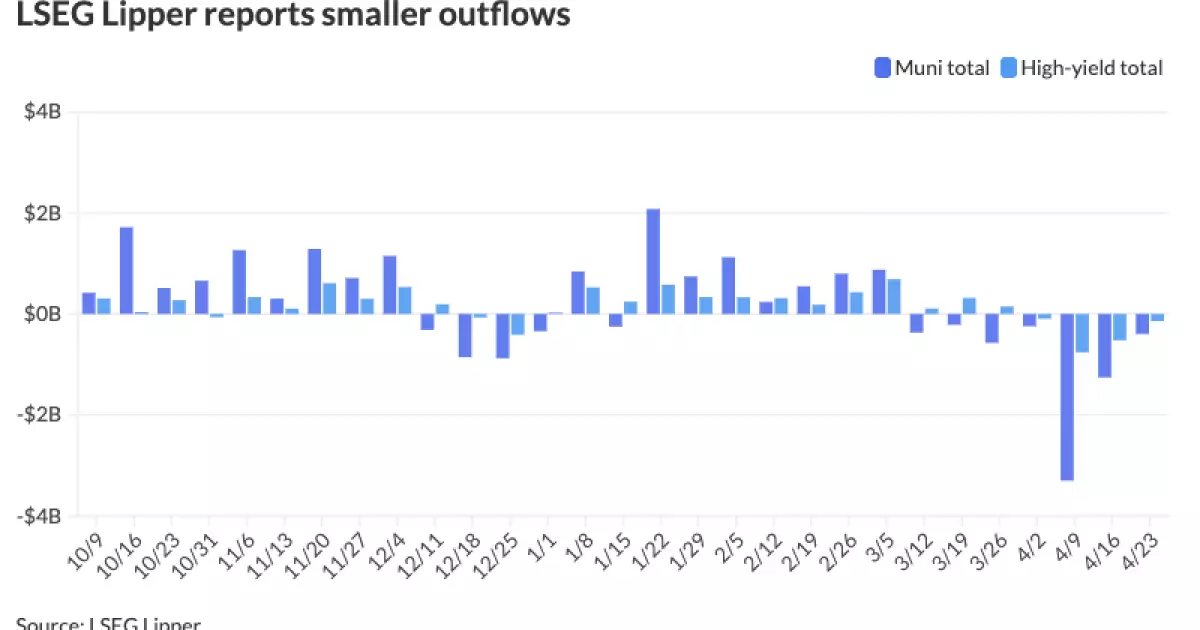Municipal bonds, commonly referred to as “munis,” have long been a staple in the portfolio of income-seeking investors. Yet, recent trends signal a significant shift in their allure—or rather, a marked decline. Several factors are contributing to this diminishing interest, causing even seasoned investors to reconsider their long-standing commitment to these once-reliable instruments.
The Unrelenting Turmoil in the Market
One of the fundamental issues plaguing municipal bonds is the ongoing turmoil in the broader financial markets. Investors pulled an astounding $397.4 million from municipal bond mutual funds in just one week, after experiencing a staggering $1.258 billion outflow the week before. These withdrawals mark the seventh consecutive week of outflows, signaling that investors are increasingly wary of the risks associated with municipal bonds. In a market where volatility seems the norm rather than the exception, it’s no wonder that investors are gravitating towards more tangible assets, seeking refuge from the unpredictability of the current economic landscape.
The Deteriorating Supply-and-Demand Dynamics
The interplay of supply and demand is crucial in any asset class, but it’s particularly vital for municipal bonds, which are already feeling the squeeze. Recent analyses by BlackRock indicate that while demand is faltering due to heightened market uncertainty, the transitioning supply has shifted from net negative to net positive—this duality only adds to the pressure on munis. Often seen as safer investments, the reality is becoming increasingly troubling. With a lack of liquidity and diminished dealer participation, investors might soon find that the munis they relied upon for stability are now fraught with complications that undermine confidence.
Perceptions of Risk Amplified by Political Uncertainty
Recent geopolitical developments, particularly the fluctuating U.S.-China trade relations, have complicated the economic outlook. The recent announcement of a 90-day pause in reciprocal tariffs, while temporarily stabilizing risk markets, is not enough to quell the broader fears gripping investors. Kim Olsan, a senior fixed-income portfolio manager, indicated that the fallout from these political circumstances is palpable, presenting a paradox where reliance on “stable leadership” at the Federal Reserve feels tenuous. When investors cannot trust political leadership, they become more risk-averse, driving them away from munis, which are often considered as reliable as government bonds until a crisis unfolds.
The Illusion of Recent Recovery
Though the last two trading sessions might have shown slight firmness in munis, it’s critical to view this as a fleeting moment rather than a robust recovery. The apparent stabilization is unlikely to signal a permanent shift. After all, municipal bonds have experienced negative total returns of 1.67% month-to-date—a much better performance than earlier in the month when losses approached 3.77%. Nonetheless, investors should question the durability of this recovery, especially given that the broader economic context remains unfavorable and unpredictable.
High Yield Meets High Anxiety
Investors are predominately influenced by yield when it comes to fixed-income securities, and municipal bonds have not delivered enough promise recently. With high-yield funds also experiencing outflows of $142.2 million—down from a staggering $522.3 million drop the previous week—it is apparent that even those who take risks are retreating. The scant yields compared to the volatility of other instruments serve as a wake-up call for investors who may have previously relied on munis as a safe bet for stable returns.
Implications for Future Investments
As a center-right commentator, it is clear to me that the fundamentals of investing must guide decision-making, rather than emotional attachments to traditional asset types like municipal bonds. In times of declining trust and heightened risks, keeping a flexible mindset is paramount. Future investors should reevaluate their portfolios, recognizing the current landscape’s complexities and uncertainties. Factors such as political instability, economic downturns, and changing interest rates are all reminders that the seemingly stable realm of municipal bonds might not be the bastion of security it once was.
The combination of negative investor sentiment, supply-demand imbalances, ongoing political threats, and marginal yields paints a concerning picture for municipal bonds. Investors are urged to take stock of their realignments and consider whether a shift away from munis is warranted to secure their financial futures amidst an ever-changing economic landscape.


Leave a Reply